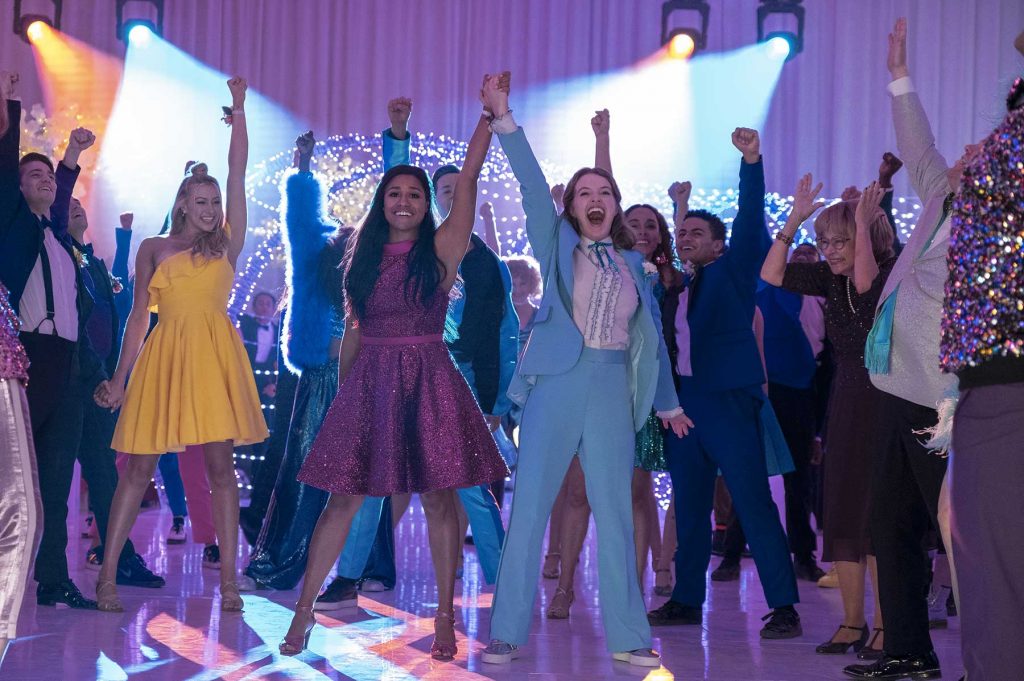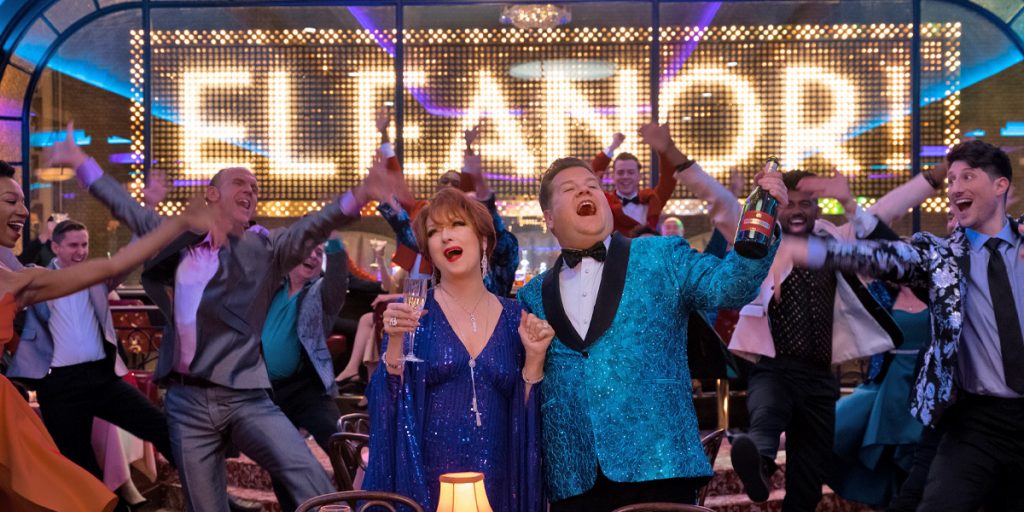The Prom is the energetic and extravagant feel-good entertainment that 2020 has been missing, full of style, soul, and a whole lot of showtunes.
Let’s just cut the chase – frankly, for the most part, 2020 has been terrible. With the panic caused by the ongoing coronavirus pandemic to a summer of unrest spurred by protests against police brutality to the most contentious presidential election in American political history, it simply hasn’t been easy to seek out solace from the stifling stress of this year’s terrors. Oftentimes, entertainment of any kind can offer us an escape from the woes of the real world, but even this comfort has been constrained, as movie theaters have closed in countries around the globe and feverishly anticipated films have been delayed for months (or even years).
Therefore, despite the fact that The Prom was in production far before the aforementioned plights of 2020, it almost seems as if Netflix and Ryan Murphy have crafted this candy-colored, cacophonous concoction specifically as a cure for our current ailments, as it truly proves to be just the toe-tapping, tuneful tonic we need after combating continual calamities over the course of this chaotic year.
The Prom begins on Broadway on the opening night of Eleanor!: The Eleanor Roosevelt Story, headlined by stage stars Dee Dee Allen (Meryl Streep, returning to her musicals after her roles in Mamma Mia!, Into the Woods, and Mary Poppins Returns) and Barry Glickman (James Corden, of Into the Woods and Cats). Unfortunately for these two pompous personalities, their show turns out to be a complete critical flop, causing their once thriving careers to come to a standstill.
To improve their standing in the public eye and earn some much-needed positive publicity, they team up with cheery chorus girl Angie Dickinson (Nicole Kidman, of the recent Bombshell and HBO’s Big Little Lies) and the ostentatious Trent Oliver (Andrew Rannells, of The Boys in the Band and A Simple Favor) and seek out a cultural “cause” to champion, eventually settling on the struggle of a lesbian high school student in small-town Indiana named Emma (newcomer Jo Ellen Pellman), who is being denied the chance to attend the prom with her girlfriend. Though the foursome heads to the heartland with less than innocuous intentions at the start, over time, by assisting Emma, they find that they have much to learn from this tenacious teen as well, abandoning their arrogant ways and committing to creating the most perfect prom Indiana has ever seen.

The Prom is “gooey” and gaudy in all the best ways – as you would expect from an adaptation of the similarly splashy and sentimental Broadway show – but if that’s not your thing, it’s probably wise to know upfront that you might not ride Ryan Murphy’s wavelength. However, those of us that can enjoy this excessive extravagance will find The Prom to be an appropriately opulent and optimistic ode to the power of one’s inner strength and self-confidence, even in the face of a society that shuns the very qualities that make us special. This is no space for “subtle” cultural commentary or understated emotions – The Prom unabashedly wears its bright, beating heart on its sleeve without hesitation, and, quite honestly, the film is all the better for it.
Thankfully, the film also refuses to ever validate the prejudiced opinions of Emma’s conservative classmates (which are skillfully skewered by Trent in the lively “Love Thy Neighbor” number). In the world of The Prom – there is never any acceptable excuse to homophobia or hatred, and these ideologies are thoroughly (and theatrically) torn to pieces in the most meretricious manner possible. Frankly, we could even learn a thing or two from how these Broadway bigwigs handle bullies.
The A-list cast that Murphy has assembled here is simply aces across the board, with absolutely no weak link the ensemble whatsoever. Obviously, Streep demands your attention from her first scene, and her diva antics as Dee Dee Allen are absolutely delightful. Her introductory performance to the small-town Indiana community at a PTA meeting (“It’s Not About Me”) is impressively invigorating, with the treasured thespian throwing herself into the absurdity of Allen’s ways with pageantry and panache, while her later romantic interactions with Keegan-Michael Key’s (Mad TV’s Key & Peele, Dolemite Is My Name) Tom – the principal of Emma’s school – are refreshingly restrained, showcasing the softer side of this swanky starlet.
Meanwhile, though much has been made of the “controversial” casting of James Corden in a queer role, aside from a few beats of overly bombastic bluster early on, he otherwise successfully taps into Barry’s soul and persuasively portrays his plucky persona. Rounding out the quartet, Kidman is an affectionally animated ally to Emma as Angie – receiving her own standout showstopper in the form of the zestful “Zazz” – while Rannells, who is sadly used somewhat sparingly, still lights up the screen whenever he appears and expresses an exhilarating elation in his performance that is completely contagious.
As the girl caught in the midst of all this musical mayhem, Pellman effectively imbues Emma with a wholly genuine warmth that allows her to stand apart from her brash Broadway buddies and act as an authentic audience surrogate for any and all queer kids who have also been the subject of such scorn and spite. We come to care so much for Emma because we see ourselves in her sadness and her suffering, as everyone is able to easily identify a time in which they too felt disdain for daring to deviate from a societal “norm” of some kind. And yet, Pellman respectably refuses to let Emma wallow in this misery for long, deftly depicting her dispositional transformation throughout the narrative of the film with a masterful maturity and inspiring others to embrace what others may call “eccentricities” with reckless abandon. It helps that Pullman has a stunning set of pipes as well, bringing down the house with big vocal moments in “Just Breathe” and “Dance With You,” the latter of which is a delectable duet sung with Emma’s closeted girlfriend Alyssa, played by Hamilton’s Ariana Debose in an empathetically emotive turn.
Though Ryan Murphy is known for his sumptuous “showiness” on series like Glee, American Horror Story, or Scream Queens, his work in film has been limited to book adaptations like Running with Scissors and Julia Roberts’ Eat, Pray, Love, which don’t quite show off his singular storytelling sensibilities. With The Prom, Murphy is finally able to “let loose” on a cinematic scale like never before, and he most certainly doesn’t waste the opportunity in any regard. His direction is deliriously dynamic, capturing the cast’s captivating choreography with an affecting sense of awe and astonishment, and he suffuses every song-and-dance number with an electrifying energy that actively enthralls the audience. In addition, the overall aesthetic of the film is equally alluring, with costume designer Lou Eyrich (American Horror Story, Hollywood) fashioning glorious garbs for every cast member while production designer Jamie Walker McCall (American Crime Story, Paper Towns) and set decorator Gene Serdena (Her, Passengers) bring the bravado of Broadway to Indiana.
In a year devoid of much delight of any kind, The Prom feels like a gift sent from above to remind us to have hope for humanity and look for the light in the world once more. It may not be particularly “subtle,” nor will it probably change the hearts and minds of those who are already rooted in their bigoted ways, but for anyone who is willing to be open to its optimism and joyous joviality, they will find that The Prom is a convivial celebration of the LGBTQ+ community and a powerful pushback to prejudice in any form, with style and soul to spare.
The Prom is now available to watch on Netflix.

